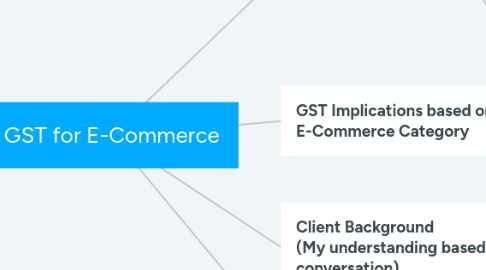
1. Legal Background
1.1. What is E-commerce as per GST law ?
1.1.1. Section 2(44) Sale of goods/service over a digital platform
1.1.1.1. Eg. Selling a product from a website (Think of Amazon, Flipkart, or any other website)
1.1.1.2. Eg. Selling a service such as video streaming (Think of Netflix, Amazon prime etc.)
1.1.1.3. The 2 main conditions are- 1. Sale should take place over an online platform 2. There should be a consideration (Price)
1.1.1.3.1. If you just advertise a product online, but sell it from your store -> It's not e-commerce The exchange of money/Sale should happen online
1.1.1.3.2. If you distribute your product/service online, But don't charge for it -> It's not e-commerce as well Eg. Free blogs, Free Consultation Calls, Free E-books etc
1.2. Who is an E-commerce operator ?
1.2.1. Section 2(45) Anyone who owns, operates, or manages a digital platform used for E-commerce
1.2.1.1. Eg. Amazon, Flipkart, Netflix etc
1.3. 3 categories of E-commerce Operators
1.3.1. Operators who sell their own Products/Services
1.3.1.1. Think of establish brands which let you buy online Eg. Zara, Decathlon, Wildcraft, Sugar Cosmetics
1.3.2. Operators who list & sell other party's products/services
1.3.2.1. Think of online aggregators Eg. Amazon, Flipkart, Airbnb etc
1.3.3. Operators who do both
1.3.3.1. Eg. Nykaa which sells their own brand as well as other brands
2. GST Implications based on E-Commerce Category
2.1. Seller of own goods/services
2.1.1. Compliance required: 1. Register for GST if sales cross a threshold limit of 20/40 lakhs (for goods/Services respectively) (Registration compulsory if you sell inter-state) 2. Issue an Invoice & Charge GST on Sale Price at applicable rates 3. Pay GST collected & File returns regularly
2.2. Seller of 3rd Party goods/services (I.e aggregator)
2.2.1. Compliance Requirements: 1. Register for GST (Compulsory - even if you make no sale) 2. Deduct TCS @1% (Tax collected at source) on the selling price 3. Issue an Invoice Charging GST @18% on the commission to the original seller 4. Pay GST & TDS collected & File GST & TDS returns regularly
2.3. Seller as well as Aggregator
2.3.1. Comply with all of the above
3. Client Background (My understanding based on our conversation)
3.1. The Business Model
3.1.1. Yours Truly (The App) will have the following segments 1. Blog, articles, posts - Free content 2. Third Party Goods sold through the app Eg. Beauty products, clothes, accessories etc. 3. Third Party Services availed through the app Eg. Counselling sessions, Yoga classes etc.
3.2. Tax Implications
3.2.1. You fall under the aggregator model & will need to register yourself under GST irrespective of your sales
3.2.2. All compliance such as TDS & GST will be applicable
3.2.3. Lets Take a typical transaction which will occur daily in the app
3.2.3.1. Consumer visits your website & does the following 3 things
3.2.3.1.1. Browses Free Content
3.2.3.1.2. Buys a Good/Service online worth Rs. 10,000 through the app (Excluding GST) (Assuming your commission is Rs.2,000)
4. How we can help you
4.1. GST
4.1.1. GST Registration
4.1.1.1. We register your entity for you
4.1.2. Assistance in Invoicing
4.1.2.1. We help you raise invoices correctly for every transaction you enter into
4.1.3. Assistance in GST Payments
4.1.3.1. We help you pay your GST liabilities on time
4.1.4. Filing GST & TCS Returns
4.1.5. Any other tax issues that may arise
4.2. Income Tax
4.2.1. File your Annual IT returns
4.2.2. Respond to any other demands/notice arising throughout the year
4.2.3. Advice on tax-saving stratergies
4.3. Accounting
4.3.1. We maintain books of accounts for you, something which is very crucial
